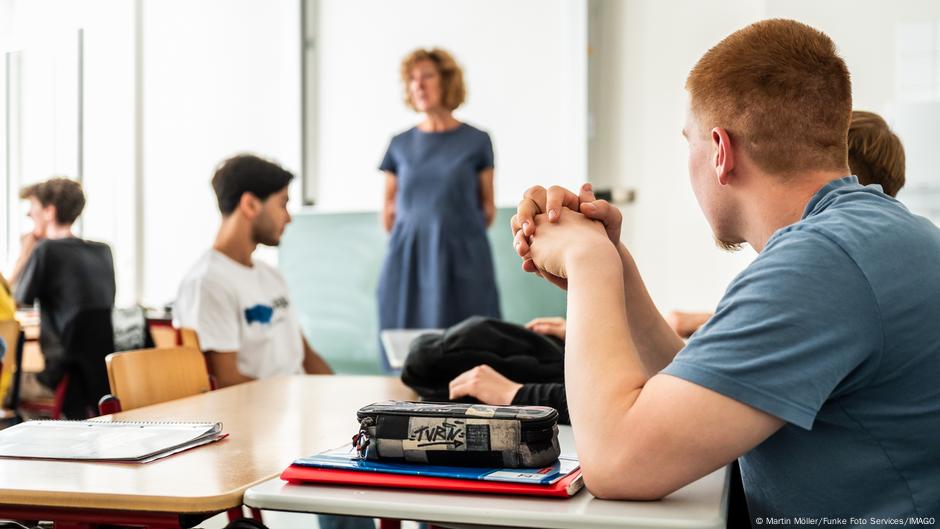Crises, disasters, war: These topics have long been covered in German schools, at least on an abstract, academic level. But how practically prepared are students for real-life crisis situations? Do they know what to do in case of an attack or emergency situation?
German Interior Minister of the conservative (CSU) wants training for such scenarios in schools. That includes how to use a fire extinguisher, but also how to respond if a fellow student is injured and how to perform CPR.
“My suggestion is that, once every school year, an extended lesson with older pupils is held that covers various possible threat scenarios and how to prepare for them,” he told the Handelsblatt newspaper. How to prepare for crises should be a part of everyday school life, he said.
The interior minister’s statements align with many observers, as well as Chancellor , who recently said: “We are not at war, but also no longer in peace,” referring to the hybrid threat from Russia.
Many experts consider it possible that Russia under could attack NATO territory before the end of the decade. In times of threat and the war against Ukraine, Germany wants to prepare — both with a stronger military and improved civil defense.
Teachers in favor of the new plan
The interior minister’s suggestion was well-received by the influential German Teachers’ Association (DL) an umbrella organization representing about 165,000 teachers in Germany. “The war has, one must be honest and just say it, long arrived in classrooms,” DL President Stefan Düll told DW. “Recently, Mr. Dobrindt has indicated that the topics of crises and wars is something which must be dealt with in schools because young people ultimately have a right to openly and honestly discuss things which could affect them.”
Training for emergency situations could help. “You learn options for action and in doing so build ability and competence. From that develops resilience, because I have dealt with things which are not pleasant, but I could actually encounter,” Düll said.
During his school years, Quentin Gärtner experienced no drills for a war or crisis. “The only thing I know is the classic fire alarm,” the general secretary of the Federal School Students Council (BSK), which represents young people’s interests, told DW.
“It makes sense to prepare us for catastrophe scenarios,” he said, adding people feel “safer, if you are prepared for an emergency and know what will happen.” Practicing for wars and disasters would also help promote a “resilient society” — and that would be especially important in times of war, Gärtner added. Just like “staying cool in crisis situations and reducing stress.”
One thing the youth representative emphasized: “School social workers and school psychologists must accompany these lessons.” Not all students are mentally prepared enough to be able to deal with these scenarios.
Mixed reactions among politicians
Dobrindt’s suggestion received mixed reactions among opposition parties. “This is clearly intended to stir up fear,” the socialist ‘s parliamentary leader Nicole Gohlke told the AFP news agency. “I find this scaremongering, especially with children and young people, unacceptable,” she criticized.
There was also criticism from the far-right party (AfD). The interior minister was trying to “make the idea of an approaching war taken for granted, even inevitable,” said AfD interior policy spokesperson Gottfried Curio.
The idea had support, however, from the . Co-leader Felix Banaszak said in an interview with private broadcaster RTL: “No, it is not fearmongering.” He is, however, not convinced that one extended lesson per year is enough to adequately prepare students.
Germany’s federal government can only make recommendations for what is taught in schools. Only the individual education ministries in each state have the authority to decide on the curriculum.
The German government wants to massively increase spending on civil and disaster protection. About €10 billion ($11.6 billion) has been budgeted until 2029 for its “civil protection pact,” which includes modernizing shelters, warning systems, providing backup water supplies and emergency vehicles.
Dobrindt has also urged the population to stock up on supplies. “It cannot do any harm. You don’t need to be a prepper to understand that a few days’ worth of supplies, a flashlight, batteries or a wind-up radio are reasonable precautions. Whoever has that is not panicked, but prepared,” Dobrindt told the Handelsblatt.
Japan or Poland as a model?
Preparing for a crisis has long been a key part of the education system in Japan. The country is affected by many natural disasters, such as earthquakes and hurricanes. The regular military threats made by North Korean dictator Kim Jong-un also cause uncertainty in the region. This is why lessons on how to prepare for a catastrophe begin in kindergarten, and emergency drills are routine in primary and secondary schools.
Poland, which borders Ukraine, takes a similar approach. Many Poles feel the threat from Russia more keenly, and schools even have compulsory weapons and safety training for 14- to 15-year-olds. Live ammunition is not used, but students are taught how to assemble, load and unload a firearm. Shooting is practiced using lasers or blanks.
“I think it is a good idea. Life is scary these days, so you have to be prepared for anything,” Marta Stolinska of the Nicolaus Copernicus primary school in Skarszewy near Gdansk told DW back in December 2024. For Alan Jaron, the training is simply “fun,” and “holding a gun in your hands and shooting feels really cool.” Parents and teachers support the weapons training.
This approach is viewed with much skepticism in Germany, which has a more pacifist culture. “German schoolyards are not parade grounds in barracks,” Stefan Düll from the teachers’ association told DW. Learning to shoot was not the “job of students, but the army,” he added. Youth advocate Quentin Gärtner finds the Polish way simply unacceptable: “Shooting lessons are definitely not part of good disaster preparedness.”
This article was originally written in German.
The post Will German schools train students for war and disasters? appeared first on Deutsche Welle.




